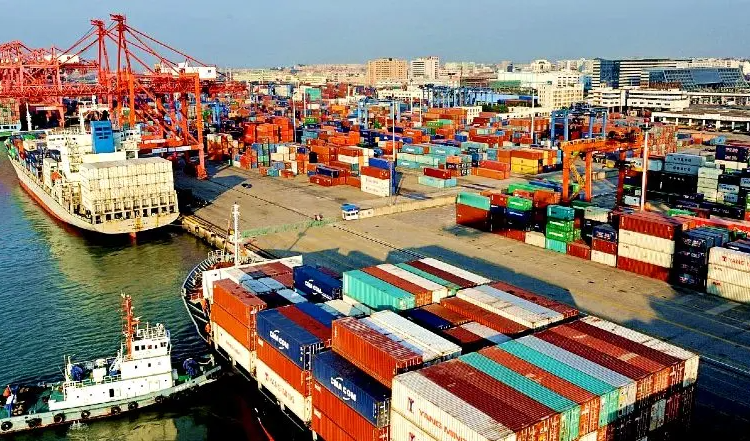Factors militating against the efficiency and effectiveness of Nigerian seaports are port cost, archaic clearing process and lack of automation. These factors have made Nigerian Ports inefficient and unattractive to importers.
And due to the inefficiencies, importers divert cargoes to more efficient seaports in neighboring countries and smuggled through the country’s porous borders making Nigeria lose several billions of naira yearly.
The losses, are from revenues accruable to government in earnings, revenues that range from ship berthing fee, three per cent levy for the Nigerian Maritime Administration and Safety Agency (NIMASA), import duty collected by the Nigeria Customs Service (NCS), on cargoes brought into the country among others.
For instance, data from the Nigeria Shippers’ Council (NSC), indicated that Nigerian ports have three free storage days and five demurrage free days, which is low compared to neighbouring Benin Republic, which has 10 demurrage-free days. Ghana, on the other hand, has eight demurrage-free days.
Meanwhile cargo dwell time (time to clear cargo) takes between 20 and 28 days in Nigerian ports, while in Benin Republic, it takes between 10 and 15 days. For Ghana, it is between 12 and 14 days and Togo eight and 12 days.
Port cost is another disadvantage of Nigeria port. Nigeria ports are described as the most expensive among its peers in neighboring countries. From un-receipted payment to double taxation and high import duty payment among others.
These factors, fueled diversion as importers that seek efficiency divert their cargoes to the neighboring ports, thereby, making Nigeria lose revenue that are supposed to be accrued to the nation.
Speaking recently on port efficiency, the executive secretary, Nigeria Shippers’ Council (NSC), Hon. Emmanuel Jime, who is saddled with the responsibility of regulating port cost and making the seaport efficient, could only lament over the interferences of officers of the Nigeria Police Force (NPF), saying the Police often disrupt cargo dwell time, increase demurrage, storage charges for the consignees.
Jime confirmed that Nigerian seaports have an unenviable reputation of being one of the ports with the longest cargo dwell time in the world.
He said, “While it takes only six hours to clear cargo in Singapore and about seven days in Lome, it takes an average of 21 days to do so in Nigeria. Long dwell time of cargo renders the ports inefficient, create congestions, increase the cost of doing shipping business and ultimately leads to high price of goods and services in the economy.”
Jime who rued Police interference, however, stated that it often disrupt cargo dwell time, increase demurrage, storage charges for the consignees, extortion, which ultimately lead to increase in prices of goods and services in the country.
He said, “NSC collaborates with several agencies, including the maritime police to enforce compliance with the established standards, eliminate corruption and bring down costs of doing business in our ports. The intervention by the council led to receipt of several reports from the users of port services (consignees, freight forwarders, haulers) about the incessant interference in the cargo clearance processes.
“The council had on several occasions carried out investigations on the matter to ascertain the truthfulness or otherwise of the claims, and confirmed that these practices were carried out by various groups,” he said.
Also speaking, a lecturer at the Lagos Business School (LBS), Dr. Frank Ojadi, said for the nation’s seaports to be efficient, there should be order and flow processes.
Ojadi, a logistics expert, however, said operators should see how they can facilitate internal processes of the port where everyone has its own objective totally different from the common objective of speedy supply chain.
He stated further that, the Nigeria Customs Service (NCS), must do their clearing fast and other agencies involved must join the Customs service for a one stop shop inspection of cargoes in other to exit the port.
He said, “there should be order and flow processes that should be put in place. It took the congestion era for us to know that trucks don’t just go into the port but, there should be a pre-preparation stage before they can access the seaport and that gave rise to Eto and holding bay.”
“We should see how we can facilitate the internal processes of the port where everyone has its own objective totally different from the common objective of speedy supply chain. The customs must do their clearing fast and other agencies involved must do their own inspection fast.
“We have seen the scanners coming in and if deployed, they can scan, then they will also help facilitate cargoes out of the port but, and another problem is most importers in Nigeria don’t import homogeneous goods so they still have to go through physical examination.”
“So, terminal operators should be allowed to run the scanners so that when a container is being offloaded, they are sent to the scanning and the result is file that when he came to pickup, he knows what he’s carrying because you have all the information. So ,in that way there will be leadership in offering speedy services at the port,” Ojadi said.
Also speaking, the National President, National Council of Managing Director of Liscenced Customs Agents (NCMDLCA), Lucky Amiwero, said Ghana ports which have throughput more than all Nigerian seaports combined are more efficient due to management.
He, however, said due to mismanagement, cargo spend more time in the port, “If you check Ghana, for instance, they have only two ports and their throughput is higher than that of Nigeria. The Nigeria problem is not the capacity. The problem is we don’t manage our system. Our cargoes spend more time in the port. They ports are not over-stretched, but rather not properly managed and not that they are over stretched, no one run a port the way we are doing here,’’ he said.
On his part, member of the governing board, Council for the Regulations of Freight Forwarding in Nigeria (CRFFN), Increase Uche, reiterated that the nation’s Seaports lack efficiency.
Uche, a former president, National Association of Government Approved Freight Forwarders (NAGAFF), said lack of free access to the port, difficulty in cargo evacuation, vessels delays, long dwell time of cargoes, among others are prevalent in the nation’s port system.
He said, “Port of Apapa and Tin Can Island are not over stretched. There are ports that are not as big as Lagos port in the sub-region but, when you go there, you see efficiency what makes a port a falling port i.e, a port that has gone out of use. Some of these things, include what are going on particularly in Tin can and Apapa. The management of the port infrastructure, the space availability and when this port were to be concessioned in 2006, we were told they will be user friendly, vessel turn around time will reduce and as well generate more fund for the economy.”
Uche, though, acknowledged that throughput increased after concession, faulted the government for not building requisite infrastructure commensurate to the increment.
“Cargo throughput increased but, as it was increasing, no commensurate infrastructure being added and space management was under utilised to the extent that we don’t need a stadium to control cargo coming in an out. What, however, applies is the management prowess of operators. You don’t allow cargoes to over stay at the terminal because port is not a storage bay, let cargoes move, the speed cargo moved from terminal to hinterland count more and this are enabler for port efficiency. So, don’t believe the ports are over-streched but bad management.”





